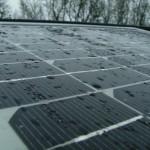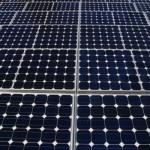Solar cells so thin they can wrap around a pencil
 Scientists in South Korea have developed solar cells so thin and flexible that they can be wrapped around a pencil. The cells are just 1 micrometer thick - thinner than a human hair.
Scientists in South Korea have developed solar cells so thin and flexible that they can be wrapped around a pencil. The cells are just 1 micrometer thick - thinner than a human hair.
They can be wrapped around a radius that is as small as 1.4 millimetres and the scientists behind the project believe they could be utilised to power wearable technology such as smart glasses or fitness trackers.
The super thin cells, developed by a team at Gwangju Institute of Science and Technology, are made from the semiconductor gallium arsenide. They are stamped directly onto a substrate to avoid adding any additional thickness, allowing them extra flexibility. The cells were then cold welded onto the electrode on the substrate by applying pressure and melting a top layer of material called photoresist that acted as a temporary adhesive. The photoresist was then peeled off to leave a direct metal-to-metal bond. The metal layer at the bottom also works as a reflector which directs stray protons back to the cells.
The team found that these ultra-thin cells only experience a quarter of the strain of similar solar cells which are 3.5 micrometers thick. Jongho Lee, an engineer working on the project, has explained that this is because "The thinner cells are less fragile under bending, but perform similarly or even slightly better".
The news of this development comes just months after MIT announced that they had developed solar cells so thin they could sit on a soap bubble. The solar cells from MIT use flexible polymer called parylene in both the substrate and over coating, with DBP used as the light absorbing layer. These cells are just one-fiftieth of the thickness of a human hair and this was achieved by making all 3 layers of the cell at the same time.
Find local, MSC certified Solar Installers
Start your quote
Find local, MSC certified Solar Installers














